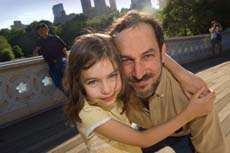 |
 |
| current issue |  |
past issues |  |
send a letter/news |  |
address update |  |
advertise |  |
about us |  |
alumni home |
Features
The OpinionatorPage 4 of 4
 UNEXPECTED FINDING: Kate Rice, second from left, pulled off a surprise 50th birthday party in July for husband Gary Langer '80, left. Below, Langer and daughter Gavriela, 6, in Central Park.
UNEXPECTED FINDING: Kate Rice, second from left, pulled off a surprise 50th birthday party in July for husband Gary Langer '80, left. Below, Langer and daughter Gavriela, 6, in Central Park.
|
"Iraq: Where Things Stand" has won ABC News five Emmy awards, including the two that cited the polling unit, but awards are not what the people in the news division talk about. They talk about the honor of being allowed into Iraqis' homes, the importance of understanding life in a country in a far deeper way than casualty counts. The thousands of interviews over five years produce a picture of what matters to Iraqis and of the gradual changes in their daily lives--feelings of safety or danger, access to electricity and clean water and medical care.
The Iraq and Afghanistan polls give voice to people rarely heard from. Figuring out how to make the polls happen gave new meaning to the term "roadblock." Langer first had to locate companies that were willing and qualified to do surveys in dangerous areas. His most recent polls in Iraq required extensive work on the questionnaire itself, careful translating and re-translating, a lot of training of the field staff and a lot of worry about their safety. Iraqis did the polling in their home regions. They fanned out from more than 400 starting points across the country, following a random-route procedure to choose homes and knock on the doors. For their own protection, the field teams didn't know who was sponsoring the poll. Shiites asked the questions in Shiite areas, Sunni Arabs in Sunni areas, Kurds in Kurdish areas. In mixed areas, some interviewers carried dual forms of identification with separate Shiite- and Sunni-sounding names.

|
Over the years of the project, interviewers have encountered explosions, police checkpoints, detentions by armed militia, and plenty of grilling about what they're doing and why. So far, however, everyone has returned safely. Interviewers report that most people, especially women, are flattered to be asked their opinions. The response rate in the 2008 Iraq poll was 65 percent; in the United States, Langer says, ABC is happy with 40 percent.
Brainstorming the next international poll is among Langer's favorite occupations, along with imagining new ways to look at data. Before he can move to new projects, however, there's the matter of the Democratic primaries to wrap up. Early exit poll results from South Dakota have started to arrive in time for the 5:40 pre-newscast briefing. Though Langer has already written a quick analysis, he says little at the meeting. In fact, after the long primary season, most of the producers and correspondents slumped against the walls look exhausted. When it becomes apparent that in less than an hour ABC will announce on "World News Tonight" that Obama has, in fact, gained enough delegates to assure him the nomination, people barely react.
Langer and several colleagues head for the elevator. Though they're traveling only a few floors, they immediately start tapping away on their BlackBerrys. "Is it really over?" someone asks. Langer glances up for a second, smiles, and returns to his tiny keyboard. More numbers are calling, and they can't wait.~
Easy to print version
blog comments powered by Disqus
